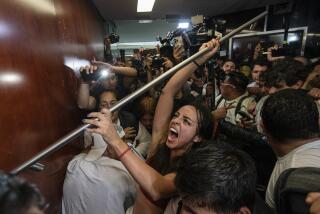Opposition May Boycott Nicaragua Vote : Wants Further Changes in Sandinista-Approved Electoral Law
- Share via
MANAGUA, Nicaragua — Days before they were to enter a 10-month election campaign, Nicaraguan opposition leaders declared Wednesday that a newly amended electoral law will not guarantee a fair vote and threatened to stay out of the race.
The Sandinista-controlled National Assembly amended the law Tuesday night to comply with a Central American peace agreement obliging Nicaragua to hold open and fair elections next Feb. 25, nine months ahead of schedule.
But while some changes in the law seem to dilute the revolutionary government’s edge in the campaign, anti-Sandinista leaders said the law does not assure their “equitable participation” on a Supreme Electoral Council that will control the election process, as the five-nation peace accord requires.
Refusing to accept Tuesday’s amendments as final, the opposition said it will urge foreign governments to bring pressure on Managua to change the law again.
“If a majority of the council is pro-Sandinista, then we are headed for a pre-planned electoral fraud,” said Alfredo Cesar, a Nicaraguan rebel leader who had spoken of returning from exile in Miami to take part in the campaign but is now deferring such a move.
Opposition Walkout
Most of the 35 opposition deputies walked out of the hall of the 96-seat Assembly during the final day of debate as the Sandinista bloc voted down all of their proposals.
Besides seeking equal power on the electoral council, the opposition had offered amendments to let exiles vote at Nicaraguan consulates abroad, to suspend the military draft, to grant a general amnesty for anti-Sandinista prisoners, to abolish a security law giving police broad arrest powers and to permit opposition groups to operate a television station.
Rafael Solis, Sandinista vice president of the Assembly, insisted that the revised law is fair. It mandates equal broadcast advertising time for each party in the race and bars the Sandinistas from using government vehicles and other property in the campaign.
But Virgilio Godoy, a 1984 presidential candidate who now sits in the Assembly for the Liberal Independent Party, called the law a “shameless mockery of the opposition and the international community,” which welcomed the regional peace accord signed Feb. 14 as a basis for settling the seven-year Contra war.
‘Provocation to War’
“The reforms approved unilaterally by the Sandinista Front are a provocation to war,” said a statement by a loose alliance of 15 opposition parties. It repeated their demand for a national dialogue to produce a new election law by consensus.
The failure of the government and its opponents to agree on election rules makes likely drawn-out negotiations that could extend well into the campaign, which is to open formally next Tuesday.
President Daniel Ortega is to visit eight countries in Western Europe starting next Tuesday in search of economic aid, some of it to finance the election.
At the center of the dispute is the makeup of the Superior Electoral Council, which in turn will name councils in each region and electoral district to regulate all aspects of the campaign and the vote.
As the law now stands, the National Assembly will choose the five members of the electoral council from nominees named by Ortega. Opposition parties may propose candidates for two council seats, and the president is required to “take them into account.”
Assembly President Carlos Nunez offered to reach an informal agreement with opposition leaders on the name of a politically independent figure who would serve with two government and two opposition members on the council.
But when opposition lawmakers insisted on making the 2-2-1 formula part of the law, he refused.
Avoiding Sandinista control of the council is essential to opposition parties because of flaws in the vote-counting procedure.
For example, the law’s critics note that poll watchers from each party are allowed to observe and challenge the ballot count at each voting station but not to receive copies of the official count--a defect that makes it harder to question the overall returns.
The Sandinistas’ reluctance to compromise follows recent steps by the opposition to unify their demands on electoral reform and explore the prospect of a single electoral front.
The group of 15, whose members range from Communist to Conservative, includes all but two parties that oppose Sandinista rule. Earlier this month, their delegates met in Guatemala City with leaders of the Contras, a step described by both sides as the start of a search for a joint electoral strategy.
Pro-government newspapers here expressed outrage at what one called a “blood wedding.” Barricada, the official Sandinista organ, ran a front-page photograph of Eli Altamirano, the Communist leader, shaking hands with rebel military commander Enrique Bermudez and declared that the Contras had corrupted the politicians.
More to Read
Sign up for Essential California
The most important California stories and recommendations in your inbox every morning.
You may occasionally receive promotional content from the Los Angeles Times.










